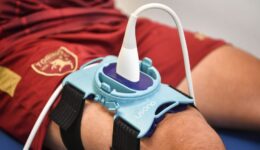(Editor’s note: This article was written by Jennifer Schenker and was originally published on The Innovator website. It is published here with their permission. Read the original post.)
When researchers at the European Organization for Nuclear Research (CERN), developed a cooling system for particles traveling at light speed through the world’s largest and highest-energy collider, they never imagined that the technology would one day be used to make corporate data centers more sustainable.
Data centers currently use 1% to 1.5% of global electricity but as demand grows for new digital services and technologies, such as AI, by some estimates they could use as much as 20% of all electricity available worldwide, resulting in massive CO2 impact equal to that of the aviation and shipping industries combined. Much of the energy is used for air conditioning or fans to cool the servers but it’s the chips that are the source of the heat. A startup called Incooling, one of 52 new deep-tech ventures created by Dutch Deep Tech venture builder HighTechXL, found a way to use CERN’s phase technology to cool the chips directly, significantly cutting electricity use – and related CO2 emissions – while radically improving the performance of semiconductors.
In June Incooling announced test results with chip maker AMD that established a new world record in central processing unit (CPU) performance, an example, the startup says, of the potential that cooling solutions can unlock when integrated with next-generation CPUs.
That’s the kind of impact HighTechXL seeks, says CEO John Bell, a former executive at both Philips and at Johnson & Johnson, where he collaborated closely with startups to co-create products.
The venture builder scouts advanced technologies from research institutions and tech companies, assesses them based on their patent position, novelty, manufacturability, and knowledge transfer, then explores ways of to use them to tackle grand societal challenges and begins the venture-building process.
Its shareholders include Dutch chip equipment maker ASML and Dutch healthcare company Philips. Together they created DeepTechXL, a €100 million investment fund to help ensure the young companies get the follow-up funding they need. One of the large Dutch pension funds and local government also agreed to invest in DeepTechXL.
“Deep Tech is needed to help solve the world’s most pressing problems but is complicated, highly risky and it takes time – it can take eight to ten years for companies to start earning revenues,” says Bell.
“We believe that by putting together the right IP with the right people and mobilizing the Deep Tech ecosystem we are well positioned for success.”
The venture builder’s approach is an example of how young companies, large corporates, government, and research organizations can work together to help solve the U.N.’s Sustainable Development Goals.
Combining Knowledge, Finance And Talent
Incooling’s journey illustrates how the model works. Through its scouting efforts CERN’s phase change technology found its way onto HighTechXL’s radar. It licensed the technology and then asked two entrepreneurs from its program – Helena Samodurova and Rudie Verweij – to see what they could do with the technology. Verweij has an IT background while Samodurova is focused on sustainability. They were tasked with finding other applications for the technology and determining whether it could be grown into a business, says Incooling co-founder Samodurova, the company’s COO.
Everything from solar panels to chips can benefit from cooling, so it was difficult at first to decide what to focus on. Then Samodurova and Verweij discovered that chips were the source of the heating problem in data centers and that phase change – the heart of the technology developed by CERN – could be used to cool them. “If a computer becomes hot, performance goes down,” says Bell. “By cooling down the chips Incooling can improve performance up to 65%. This is very attractive for all kinds of companies that work with chips because it means you can significantly increase the performance of a server without having to buy a new one.”
Six months in, Incooling raised funding. “Knowledge, financing and talent are all very important ingredients to success,” says Samodurova.
“At HighTechXL, we are surrounded by amazing people who helped us get where we are today. I can’t imagine a business like Incooling being built anywhere but here.”
HighTechXL backer ASML supported Incooling from its inception, helping with everything from engineering, to the patent process and commercialization and market research, she says.
The chip equipment maker’s collaboration with Incooling culminated in a pilot project that involved the startup’s solution being tested in an ASML data center. “ASML views the primary benefits of this relationship as accruing to Incooling, while potential value for ASML could emerge over time if Incooling’s solution becomes integrated into the ASML infrastructure,” Rob van der Werf, ASML’s Government and External Affairs Director Startup Partnership, said in a written response to questions.
Having ASML as the startup’s pilot customer “was a way to support our entry into the market. It helped us grow in all kinds of ways and proved we could work together.” says Samodurova.
Indeed, ASML and Incooling won an award for the most successful and impactful innovative collaboration between a corporate company and a startup in a 2020 Dutch contest.
A Two-Way Street
Van der Werf says that ASML gives a lot but also a gets a lot from the relationship with HighTechXL.
“This is not just about funding,” says van der Werf. “From our own history we have learned that having access to a network of experts that are willing to help you solve complex problems is extremely valuable.”
For example, he says another of the venture builder’s startups faced a design challenge for a highly energy efficient complex machine. Following sessions with ASML experts, a design was developed that surpassed the initial requirements in terms of efficiency, output and cost-effectiveness.
ASML also benefits in multiple ways from the relationship with the venture builder, says Van der Werf. “Collaborating with HighTechXL provides talented ASML employees with an opportunity to participate in a customized personal development program that allows them to share their expertise with startups and be part of a different entrepreneurial experience,” he says. “ASML employees learn a lot by being involved with startups.”
The venture builder’s corporate partners are collaborators and potential customers of the startups in the program. It is also possible for corporates to launch strategic innovation challenges that lead to the creation of new companies. They get early access to the technology but not exclusivity, says Bell.
Next Up? Advanced MedTech
In September, a new venture building program for startups in the healthcare and MedTech sector, called HealthTechX, was launched. The partners involved are Philips, HighTechXL, local government agency Brabantse Ontwikkelings Maatschappij (BOM), DeepTechXL and Invest-NL.
The new program aims to give an extra boost to the creation, building and development of startups in advanced medical technology in the Brainport Eindhoven region, which includes over 5000 high tech and IT companies.
HealthTechXL officially started at the beginning of September with 50 participants. In the first half of 2024, the teams will pitch their proposal to investors, potential partners and the broader Brainport startup community. The program is led and implemented by HighTechXL and the BOM. The BOM, DeepTechXL and Invest-NL intend to invest in companies that emerge from the program.
One of the aims of the new ventures is to enable talents leaving Philips to learn and get them involved in creating new companies locally. At the same time, the set-up will strengthen the innovative ecosystem, says Bell.
ASML – the most valuable deep tech company in Europe, with a market cap of about €220 billion – spun-out of Philips some 40 years ago, notes Bell.
It will be interesting to see what local talent comes up with next.


